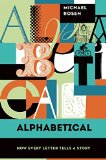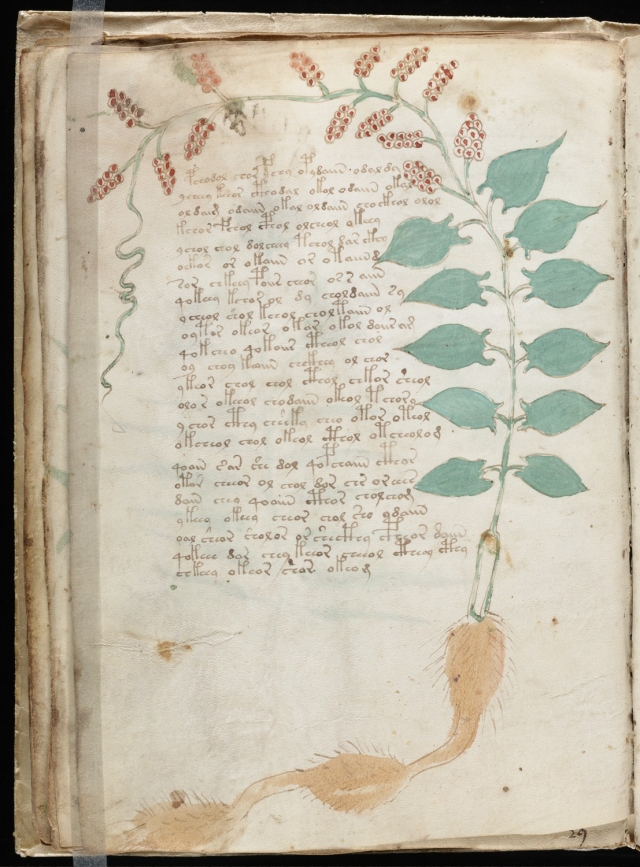Summary | Excerpt | Reviews | Beyond the Book | Read-Alikes | Genres & Themes | Author Bio

Critics' Opinion:
Readers' Opinion:
First Published:
Feb 2015, 448 pages
Paperback:
Feb 2016, 256 pages
 Book Reviewed by:
Book Reviewed by:
Kate Braithwaite
Buy This Book
This article relates to Alphabetical
In reviewing Alphabetical: How Every Letter Tells a Story, by Michael Rosen, I wrote that most readers would learn something, however small, from such a wide-ranging look at the English language. In my case, I was introduced to the Voynich Manuscript, written in central Europe in the fifteenth century, in a language that no expert has been able to translate. Rosen is firm in his assertion that the manuscript is a complex hoax but in truth theories about its provenance and meaning abound.

The story of the manuscript is as interesting as any lover of books and mysteries could wish. Around 1912, Wilfrid Voynich, a Polish refugee who became a naturalized British citizen and a London bookseller, acquired thirty manuscripts from a private Jesuit-owned library in Italy. The manuscript that would come to be known by Voynich's name was different from the others in several regards. On first glance it appears to be a botanical or pharmaceutical codex; a handwritten book of roughly 240 vellum pages with each page showing delicately drawn and colored plants, diagrams or charts and a substantial amount of text presumably to complement each illustration. The text, however, is beautifully penned in a range of consistently used but unrecognizable characters broken into word-sized chunks and it has proved to be indecipherable. The illustrations are confusing too. The plants are not clearly identifiable and named, there are obscure cosmological charts and numerous drawings of naked women bathing in pools connected by networks of pipes as well as drawings of carefully labeled apothecary jars housing unidentifiable parts of roots and plants.
Efforts to trace the life of the manuscript before Voynich's purchase are ongoing. Researchers believe it was once the property of Rudolf II, the emperor of Bohemia in the sixteenth century and from there place it in the hands of Georg Baresh, a seventeenth century alchemist from Prague. It is believed that Baresh sent it to a group of Jesuit scholars to see if they could decipher it and it was kept safe in Jesuit hands until Voynich bought it in 1912.
The Voynich manuscript, if it is a hoax, is a very old one. The vellum has been carbon-dated to the early years of the fifteenth century. It's also very cleverly done. The text flows in a flawless script without marking of errors or changes. The characters used are not random. There is a recognizable "alphabet" of roughly 24 letters causing speculation that the manuscript may have been written in code, whereby a European language was transformed using a cipher.
Since Voynich discovered the manuscript, it has been extensively studied by amateurs, researchers, academics and even by William F. Friedman, chief cryptographer at the National Security Agency. Most recently Professor Stephen Bax of Bedford University has claimed to have "translated" ten repeatedly used words in the manuscript but it's a claim dismissed by many of the online amateur experts attracted to this centuries-old mystery.
Today the Voynich Manuscript is held in the Beinecke Rare Book and Manuscript Library at Yale University and the whole can be viewed as a pdf file. Looking at the pages, it is not hard to see why it has attracted such interest. Who wouldn't want to be able to read the book that can't be read?
Picture of page from Voynich Manuscript courtesy of Beinecke Rare Book and Manuscript Library. Yale University
Filed under Cultural Curiosities
![]() This "beyond the book article" relates to Alphabetical. It originally ran in February 2015 and has been updated for the
February 2016 paperback edition.
Go to magazine.
This "beyond the book article" relates to Alphabetical. It originally ran in February 2015 and has been updated for the
February 2016 paperback edition.
Go to magazine.





The Flower Sisters
by Michelle Collins Anderson
From the new Fannie Flagg of the Ozarks, a richly-woven story of family, forgiveness, and reinvention.

The House on Biscayne Bay
by Chanel Cleeton
As death stalks a gothic mansion in Miami, the lives of two women intertwine as the past and present collide.

The Funeral Cryer by Wenyan Lu
Debut novelist Wenyan Lu brings us this witty yet profound story about one woman's midlife reawakening in contemporary rural China.
Your guide toexceptional books
BookBrowse seeks out and recommends the best in contemporary fiction and nonfiction—books that not only engage and entertain but also deepen our understanding of ourselves and the world around us.